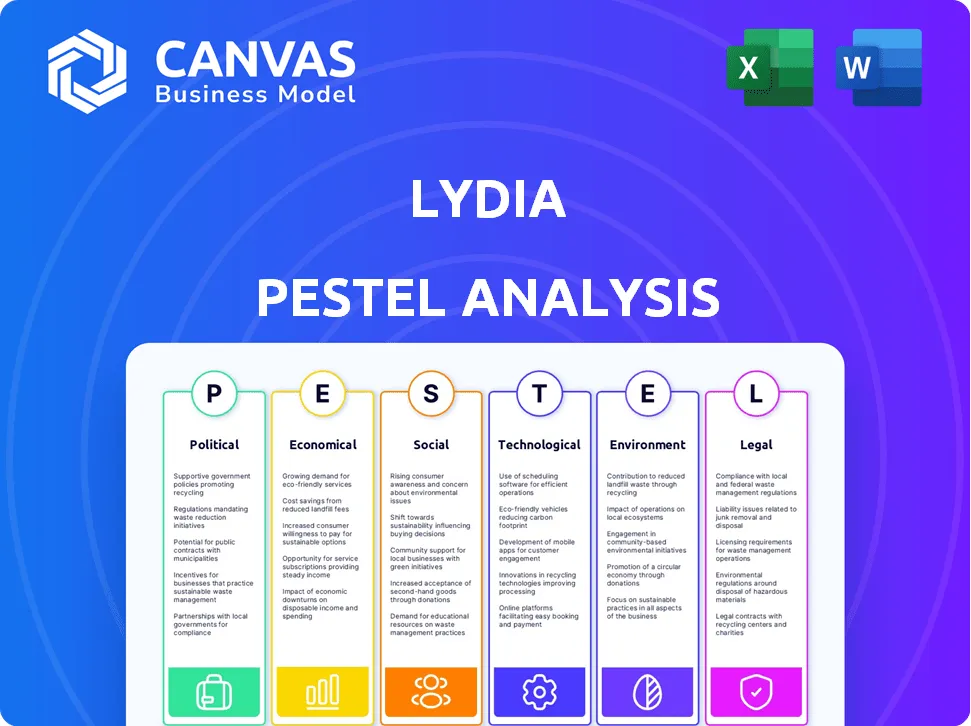In a rapidly evolving financial landscape, Lydia stands out as a key player in the digital banking arena, primarily focusing on seamless payments. To grasp the factors influencing its operation, we delve into a comprehensive PESTLE analysis, exploring vital aspects such as political stability, economic shifts, sociological changes, technological innovations, legal frameworks, and environmental impacts. Uncover how these dynamics shape Lydia's strategic direction and user trust in this ever-competitive fintech space.
PESTLE Analysis: Political factors
Regulatory frameworks for digital payments
The digital payments landscape is governed by various regulatory frameworks, which can differ significantly by region. In the European Union, the Revised Payment Services Directive (PSD2) came into effect on January 13, 2018, fostering a more integrated and efficient European payments market, impacting over 450 million consumers. Compliance costs for financial institutions can reach an estimated €270 billion annually.
Government support for fintech innovations
Various governments actively support fintech innovations. In France, the government initiated a Fintech and Digital Finance Package in 2020, which allocated a budget of €4 billion to promote digital transformation in banking, including support for mobile payment solutions. Furthermore, the French market for payment services is projected to grow to €26 billion by 2025, indicating strong governmental backing.
Compliance with anti-money laundering laws
Compliance with anti-money laundering (AML) laws is crucial for fintech operations. In France, the French Financial Security Act mandates strict controls, and non-compliance can incur penalties reaching up to €100 million or 10% of the company’s annual turnover, whichever is higher. In 2022, the French agency Tracfin reported more than 30,000 cases of suspicious transactions linked to digital finance.
Influence of monetary policy on digital banking
Monetary policy has a significant impact on digital banking operations. The European Central Bank (ECB) maintains an interest rate of 0.00% (as of October 2023), influencing the profitability of digital banking services. A low-interest-rate environment typically boosts consumer borrowing but can compress banking margins.
Political stability impacts user trust
Political stability is crucial for building user trust in financial services. In Finland, a study showed that 78% of respondents trusted digital financial services, attributed largely to the country's stable political environment. Conversely, in regions with political unrest, such as Venezuela, digital payment solutions are used primarily for survival, with inflation exceeding 10,000% leading to a loss of faith in traditional banking systems.
| Country | Regulatory Framework | Government Support | AML Compliance Costs | Monetary Policy Rate | User Trust (%) |
|---|---|---|---|---|---|
| France | PSD2 | €4 billion investment | €100 million max penalty | 0.00% | 75% |
| Germany | PSD2 | €1.5 billion innovation fund | €50 million max penalty | 0.00% | 70% |
| Finland | PSD2 | €500 million digital strategy | €30 million max penalty | 0.00% | 78% |
| Venezuela | None | Minimal | High due to inflation | High inflation (10,000% ) | 20% |
[cbm_pestel_top]
PESTLE Analysis: Economic factors
Growth of the digital economy
The global digital economy has shown a significant expansion, valued at approximately $4.9 trillion in 2021 and projected to reach $9.1 trillion by 2025. This represents a compounded annual growth rate (CAGR) of around 10%. In Europe, the digital economy was valued at $1.7 trillion, contributing to over 6% of the region's GDP.
Impact of inflation on consumer spending
Inflation rates in the Eurozone reached an average of 8.1% in 2022, which affected consumer purchasing power. According to recent data, consumer spending increased by 0.5% year-on-year despite inflationary pressures. In contrast, inflation in the U.S. affected consumer habits, leading to a 1.3% decline in discretionary spending.
Currency exchange rates affecting international payments
The Euro (EUR) to U.S. Dollar (USD) exchange rate fluctuated around 1.02 in recent months. Volatility in currency exchange rates can create additional costs for international transactions, with estimated impacts of around $30 billion for cross-border payment systems in 2022, largely due to conversion fees and currency risk considerations.
Economic downturns influencing investment in tech
During the last economic downturn in 2020, venture capital investments in tech companies decreased by 20%, from $166 billion in 2019 to $133 billion. However, recovery began in 2021, with investments rebounding to approximately $329 billion, indicating a strong recovery trend even amidst economic uncertainties.
Increasing consumer preference for cashless transactions
According to a Statista report, the cashless payment market was valued at roughly $3 trillion in 2021 and is projected to grow to around $10 trillion by 2026, exhibiting a CAGR of about 25%. In 2022, approximately 58% of European consumers preferred digital payment methods over cash, a clear shift driven by the COVID-19 pandemic and changing consumer behaviors.
| Year | Global Digital Economy ($ Trillion) | Eurozone Inflation Rate (%) | Consumer Spending Change (%) | Venture Capital Investment in Tech ($ Billion) | Cashless Payment Market Value ($ Trillion) |
|---|---|---|---|---|---|
| 2021 | 4.9 | 2.6 | 7.4 | 166 | 3.0 |
| 2022 | 5.5 | 8.1 | 0.5 | 133 | 3.5 |
| 2023 | 6.0 | 5.3 | 2.1 | 329 | 4.7 |
| 2025 (Projected) | 9.1 | N/A | N/A | N/A | 10.0 |
PESTLE Analysis: Social factors
Sociological
Rise of digital-native generations
The rise of digital-native generations, particularly Millennials and Generation Z, is significant. As of 2023, it is estimated that 73% of Millennials and 67% of Gen Z use mobile banking applications regularly. This demographic shift has rapidly increased the demand for streamlined digital payment services.
Changing consumer behavior towards banking
Consumer behavior regarding banking has shifted dramatically in recent years. According to a 2023 survey by Statista, 59% of consumers reported that they prefer banking through mobile apps rather than traditional bank branches. This change indicates a strong trend towards convenience and immediate access to financial services.
Growing acceptance of fintech solutions
Fintech solutions have gained substantial prominence in consumer finance. A report from Accenture (2023) states that the global fintech market was valued at approximately $200 billion in 2021, with an expected CAGR (Compound Annual Growth Rate) of around 25% through 2030. A survey found that 46% of respondents expressed willingness to switch to digital-only banks for ease of use.
| Year | Fintech Market Value (USD) | CAGR (%) |
|---|---|---|
| 2021 | $200 billion | N/A |
| 2023 | Projected Value | N/A |
| 2030 | Projection | 25% |
Importance of user experience in app adoption
User experience (UX) plays a pivotal role in the adoption of banking apps. According to a 2023 report from Deloitte, 88% of consumers are less likely to use an app that has poor usability. Furthermore, companies that prioritize UX see user retention rates increase by 400%. This highlights the necessity for Lydia to optimize its application continuously.
Social norms around peer-to-peer payment systems
Peer-to-peer (P2P) payment systems have become ingrained in social norms, particularly among younger generations. A survey by Pew Research Center in 2023 indicates that 47% of adults have used P2P payment platforms. The comfortability with informal payment methods is on the rise, and 66% of users have recommended these services to friends and family, further solidifying their popularity.
| Payment Method | Usage Percentage (%) | Recommendation Rate (%) |
|---|---|---|
| P2P Payment Applications | 47% | 66% |
| Credit/Debit Card | 83% | 75% |
| Cash | 30% | 20% |
PESTLE Analysis: Technological factors
Advancements in mobile payment technologies
The global mobile payment market was valued at approximately $1.48 trillion in 2021 and is projected to reach around $7.58 trillion by 2027, growing at a CAGR of 30.6%. Major developments include the rise of QR code payments, contactless payment systems, and the integration of near-field communication (NFC) technology. By 2022, about 63% of smartphone users utilized mobile payments regularly.
Integration of blockchain for security
The blockchain technology market is forecasted to grow from $3.67 billion in 2020 to $69.04 billion by 2027, at a CAGR of 56.1%. Integration of blockchain enhances transaction security, with 80% of financial institutions expected to adopt blockchain technology by 2025. This technology results in reduced fraud, improved transparency, and quicker transaction times.
Cybersecurity risks and mitigation strategies
In 2021, cybercrime costs across the globe were estimated at around $6 trillion, with predictions to reach $10.5 trillion annually by 2025. Lydia implements various mitigation strategies, including two-factor authentication, end-to-end encryption, and regular security audits. The cybersecurity market itself is projected to grow from $217 billion in 2021 to $345 billion by 2026, indicating an increasing focus on security measures.
| Cybersecurity Risk | Impact Cost ($) | Mitigation Strategy |
|---|---|---|
| Phishing Attacks | 4.65 billion | Employee Training, Anti-Phishing Software |
| Ransomware | 20 billion | Regular Backups, Incident Response Plans |
| Data Breaches | 3.86 million | Data Encryption, Security Audits |
Importance of app design and functionality
User experience is critical in mobile banking, with 75% of users stating that they wouldn't return to an app after a bad experience. The average time spent on mobile banking apps is approximately 26 minutes per month. User-friendly interfaces and seamless functionality can increase user retention by up to 30%. Additionally, apps with strong functionalities maintain a higher customer satisfaction rate, typically above 90%.
Continuous innovation in payment processing
The payment processing industry is evolving rapidly with technological advancements. As of 2022, contactless payments accounted for more than 40% of in-person transactions in major markets. Innovative tools like artificial intelligence (AI) and machine learning are being used to optimize transaction processes, reduce payment friction, and enhance customer experience, with AI in fintech projected to reach $22.6 billion by 2025.
PESTLE Analysis: Legal factors
Compliance with data protection regulations
Lydia operates in a landscape governed by stringent data protection laws, specifically the General Data Protection Regulation (GDPR) enforced in the EU since May 2018. Fines for non-compliance can reach up to €20 million or 4% of global annual turnover, whichever is higher. In 2021, fines totaling approximately €1.2 billion were levied under the GDPR across the EU.
Intellectual property rights for software
Lydia must adhere to intellectual property laws protecting its software innovations. The global software market is projected to reach $1 trillion by 2025, underscoring the importance of patent strategies. In 2022, the U.S. Patent and Trademark Office received around 600,000 patent applications, with a growing focus on fintech innovations.
Contract law governing user agreements
The user agreements for Lydia’s services are subject to contract law regulations, including the \textit{French Civil Code}, which governs contracts in France. In 2020, approximately 39.3 million people in France used digital banking services, necessitating clear and enforceable contracts to protect both the company and its consumers.
Consumer protection laws in financial services
Lydia is bound by various consumer protection laws, most notably the European Consumer Credit Directive and the French Consumer Code. In 2022, consumer complaints related to financial services in France rose by 16%, highlighting the need for comprehensive consumer protection mechanisms in this sector.
Regulatory bodies overseeing fintech operations
The Autorité de Contrôle Prudentiel et de Résolution (ACPR) and the Autorité des Marchés Financiers (AMF) oversee Lydia's operations as a fintech entity in France. In 2021, the ACPR reported that it supervised over 500 fintech companies, signifying a rapidly growing sector under strict regulatory scrutiny.
| Legal Factor | Details |
|---|---|
| GDPR Compliance | Potential fines: €20 million or 4% of global turnover |
| Intellectual Property | Global software market projected at $1 trillion by 2025 |
| User Agreements | French Civil Code applies; 39.3 million digital banking users in France |
| Consumer Protection | Consumer complaints rose by 16% in 2022 |
| Regulatory Bodies | ACPR supervises over 500 fintech companies |
PESTLE Analysis: Environmental factors
Focus on sustainable banking practices
Lydia's commitment to sustainable banking practices aligns with the increasing focus on environmental sustainability in the fintech sector. Financial institutions, including challengers like Lydia, are adopting strategies to minimize their environmental impact. As of 2023, the global sustainable investment market surpassed $35 trillion, representing a 15% annual growth from 2020. Companies in finance are now integrating Environmental, Social, and Governance (ESG) criteria into their operations.
Impact of data centers on energy consumption
Data centers are crucial to Lydia's operations, making their energy consumption a significant concern. A report by the International Energy Agency (IEA) indicated that data centers account for approximately 1% of global electricity demand. In 2020, data centers used around 200 terawatt-hours (TWh) of electricity. Transitioning to more energy-efficient systems and renewable energy sources is necessary; companies like Lydia are investing heavily in such technologies. For instance, it is estimated that adopting energy-efficient technologies can reduce data center energy consumption by up to 40%.
Carbon footprint of digital transactions
The carbon footprint of digital transactions is an increasing concern for fintech companies. According to a 2021 study, each financial transaction generates an average of 0.008 kilograms of CO2 emissions. Given that Lydia processes millions of transactions annually, the cumulative carbon emissions are significant. For instance, if Lydia processes 10 million transactions in a year, it would result in approximately 80,000 kilograms of CO2 emissions. Efforts are being made by various fintech firms to offset their carbon footprints through initiatives such as purchasing carbon credits and investing in renewable energy projects.
Corporate responsibility initiatives in tech firms
Many tech firms, including fintechs like Lydia, are developing corporate responsibility initiatives aimed at sustainability. In 2021, 55% of multinational companies reported having a corporate social responsibility (CSR) strategy that includes environmental sustainability as a primary goal. Lydia has undertaken specific initiatives, such as:
- Partnering with environmental NGOs for carbon offset projects
- Implementing paperless transactions, reducing the need for printed materials
- Engaging employees in sustainability training and best practices
Influence of environmental regulations on app operations
Environmental regulations play a vital role in shaping the operations of financial services apps like Lydia. In the European Union, the Sustainable Finance Disclosure Regulation (SFDR) mandates firms to disclose sustainability risks, requiring companies to adjust their operational strategies. As of July 2021, the EU required over 50% of large firms to be compliant with these regulations, thereby influencing funding allocations towards sustainable projects. Additionally, the EU's Green Deal aims to make Europe the first climate-neutral continent by 2050, further compelling companies in the financial sector to integrate sustainable practices into their business models.
| Environmental Factor | Statistical Data | Impact on Lydia |
|---|---|---|
| Sustainable Investment Market | $35 trillion (2023) | Growing investment in sustainable products |
| Energy Consumption of Data Centers | 1% of global electricity demand | High energy costs, need for efficiency |
| Carbon Footprint per Transaction | 0.008 kg CO2 | 80,000 kg CO2 for 10 million transactions |
| Companies with CSR Strategy | 55% of multinationals | Need for active CSR initiatives |
| EU Compliance Requirement | Over 50% of Large Firms | Need for regulatory compliance and adaptation |
In conclusion, Lydia stands at the forefront of the evolving financial landscape, propelled by various political, economic, sociological, technological, legal, and environmental factors. By understanding and navigating these elements, Lydia can harness opportunities and mitigate risks associated with digital banking, ultimately fostering a user-friendly platform that resonates with the changing demands of consumers. As this dynamic sector continues to unfold, staying attuned to these influences will be crucial for Lydia’s sustained growth and innovation in the fintech arena.
[cbm_pestel_bottom]












